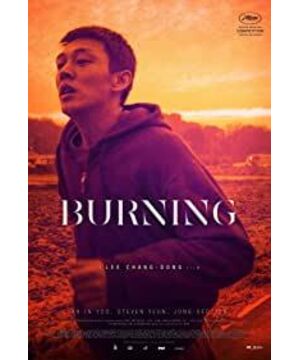This article was published on the Taotao Tao Film Official Account (ttfilm) on June 12, 2018. The content has changed slightly from the official account. If you need to reprint, please contact Douyou.
===================================================== ===========================
After a lapse of eight years, Li Cangdong finally returned to Cannes with his new work "Burning", which set the highest score in Cannes history.
His last work, "Poem," won the Best Screenplay Award at Cannes. The last time was after "Miryang" was sealed by Jeon Doyeon. This is a director valued by Cannes. And he deserves it.
"Burning" is adapted from the short story "Burning the Barn" by Haruki Murakami. Murakami's novels are not easy to adapt, his words have a unique sense of language, and the fun of reading will be lost after videography. What's more, the structure of the story is often uneven, and the characterization is very different from the film. Therefore, there are only six films adapted from Haruki Murakami's novels so far, and none of the five films before "Burning" can be called successful adaptations.
Turning Murakami's novel into a movie is an almost impossible task. And Li Changdong succeeded.
Li Cangdong's genius lies in how he knows how to choose between blanking and filling.
The original book "Burning the Barn" is a first-person short story: "My" friend Emi befriends a wealthy boyfriend in Africa. He has an unusual hobby of setting fire to useless barns from time to time. After the three were together for a while, Emi disappeared. "I" tried everything but couldn't find the answer.
The original story has a loose structure and light brushstrokes. One sentence is written in the east and one sentence is written in the west. It seems that nothing is specified. After reading the hints in the text, you will find that there is a sinister story buried under the calm surface.
Li Cangdong's first step in adapting this story was to extract the key words of the original work and let it run through the movie: powerlessness. He sets an insurmountable class difference for the characters, which in turn makes them unable to communicate and understand, all for this keyword.
Like this teaser poster:
In the rain, a confused and confused boy was blocked by a glass door and could not enter if he wanted to. This picture can be seen as the protagonist standing outside the door of truth and cannot be touched, or it can be seen as a symbol of the solidification of class, a boy in a cheap T-shirt cannot enter the world he wants to enter.
Li Changdong said that "Burning" is a story about today's young people. Young people in South Korea have been disappointed with reality and have lost confidence in the future. This sense of powerlessness has accumulated into a rage that has nowhere to vent. The name of the film "Burning" refers to the three living states of the three protagonists, who have a sense of powerlessness against reality for different reasons.
Zong Xiu, the family of origin has long been broken, struggling alone at the bottom, and has never been able to get a sense of social recognition. He is the uncomfortable one in almost all social situations, because he knows how others see him as someone who has no social resources.
Zong Xiu can only receive silent calls at various inopportune times (late at night, when going to the toilet), and the outgoing calls are often voicemails.
And Ben, who is both right and left, is talking on his mobile phone.
There is a shot about Zong Xiu, which may be inspired by Murakami's other novel "The Hunting Knife", which is also a story about feeling powerless. The knife is the protagonist's tool against the numbness of life.
Huimei grew up in a poor and unhappy family and had a deep desire for material things, but she never got what she wanted.
This pantomime "Peeling Oranges" is the same as the original, showing her powerlessness for material things.
Like her dance of "little hunger" and "great hunger" in front of a roomful of rich people.
Even Ben, who lived a good life, was burnt out by wealth and luxury, and he desperately sought fun and excitement to fight against nothingness.
Li Cangdong continued to use contrast to deepen the feeling of the huge class difference.
Zong Xiu's pickup and Ben's Porsche
Zongxiu, Huimei's residence and Ben's high-end apartment.
Ben's kitchen is even bigger than Emi's entire home.
(Actually, I thought the director would give a close-up of Ben's hand-made spaghetti bolognese, but it didn't. Maybe he didn't want to be too straightforward)
What's more cruel is that Li Cangdong also told us that if Zong Xiu's father followed the good advice of others, Zong Xiu might have joined the rich class in Jiangnan District.
To say that the three protagonists have something in common, it is probably the unrequited love.
Zongxiu likes Huimei, but she can only watch her run to the rich and famous; Huimei can repay Zongxiu's love, but she cuts off this possibility because of the pursuit of material things; Ben can't give love, and all he gets is material things Emotions exchanged for sweet words. It looks like he has everything, and he is also jealous of the mutual cherished feelings between Hye Mi and Jong Soo.
In addition to "powerlessness", the film also has half the keyword "mystery". Li Cangdong showed extraordinary skill in designing these "mysteries", not only making use of the original setting, but also making full use of the film's advantage of traversing time and space. There are countless doubts and suspense in the film, some have been answered, and some have never given a clear answer. And those mysteries that are solved often lead to bigger mysteries.
For example, is it true that Huimei fell into a well when she was a child and was rescued by Zongxiu.
There is a shadow at the beginning of the original book "Norwegian Wood". Li Changdong retained the original symbolic meaning of the well (a boy is her only savior in a girl's life without hope), and added another layer of meaning: a sense of powerlessness from the family.
Emi didn't tell her family about her falling into the well. With this line, the audience immediately understood that Emi was a person who was abandoned by her family.
Then I think of Zong Xiu, the biological father was sentenced for violent resistance to the law, and the mother ran away for 16 years and met again but only checked her mobile phone.
And Ben has a big happy family. Zong Xiu could only watch from a distance.
Without the support from the family of origin, there is no way out, and in front of them are the inaccessible and incompetent elites.
Another example is whether Emi's cat really exists. This mystery not only showed Emi's playful character, but also increased Ben's suspicion. Everyone who has seen the movie can understand this sentence, let's not expand it.
As for whether the ending of Zongxiu and Ben is fantasy or reality, the audience can choose the answer they are willing to believe. Li Cangdong just wanted to use this ending to let the anger in Zong Xiu's heart explode once, so that the audience could feel the anger that broke out in this icy despair, and his task was completed.
In Li Cangdong's shots, often even the sun has a cruel meaning. The warmer the sun, the colder the reality.
As for this ending, many people think that Li Cangdong is blurring the boundary between reality and fantasy, but I would rather understand that this time Li Cangdong has reserved a little warmth for this cruel story, that is, Zong Xiu is still writing the novel he loves, he has not yet Totally bow your head.
Even if there is no way out, burn calmly.
View more about Burning reviews











